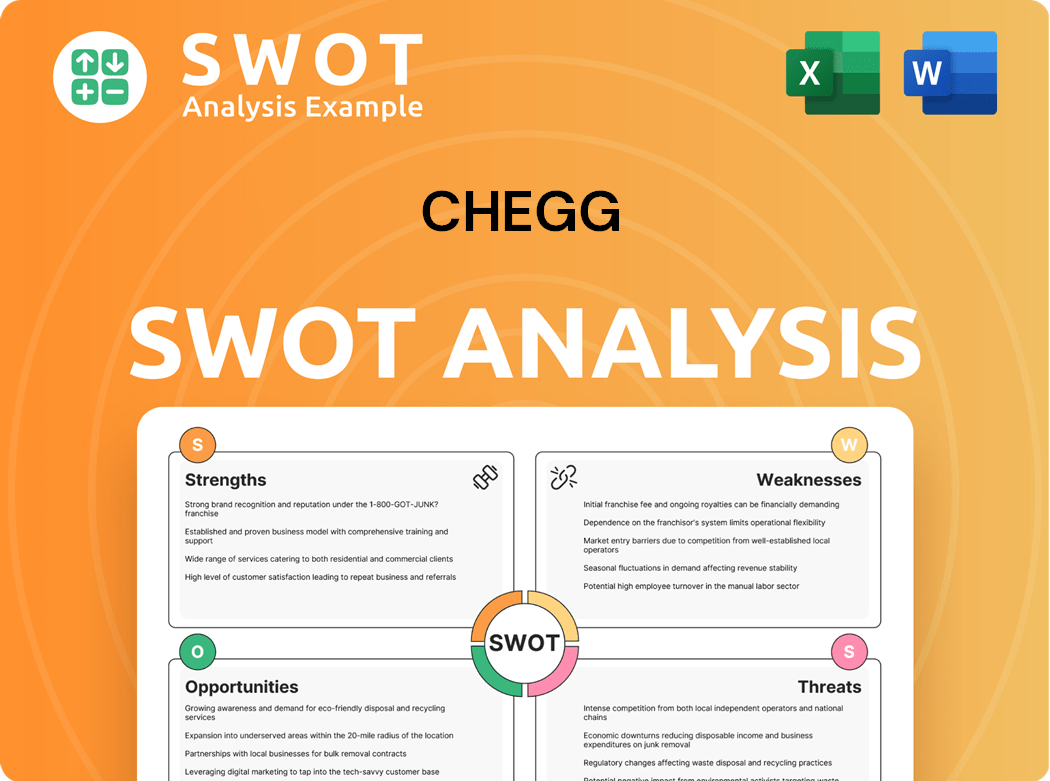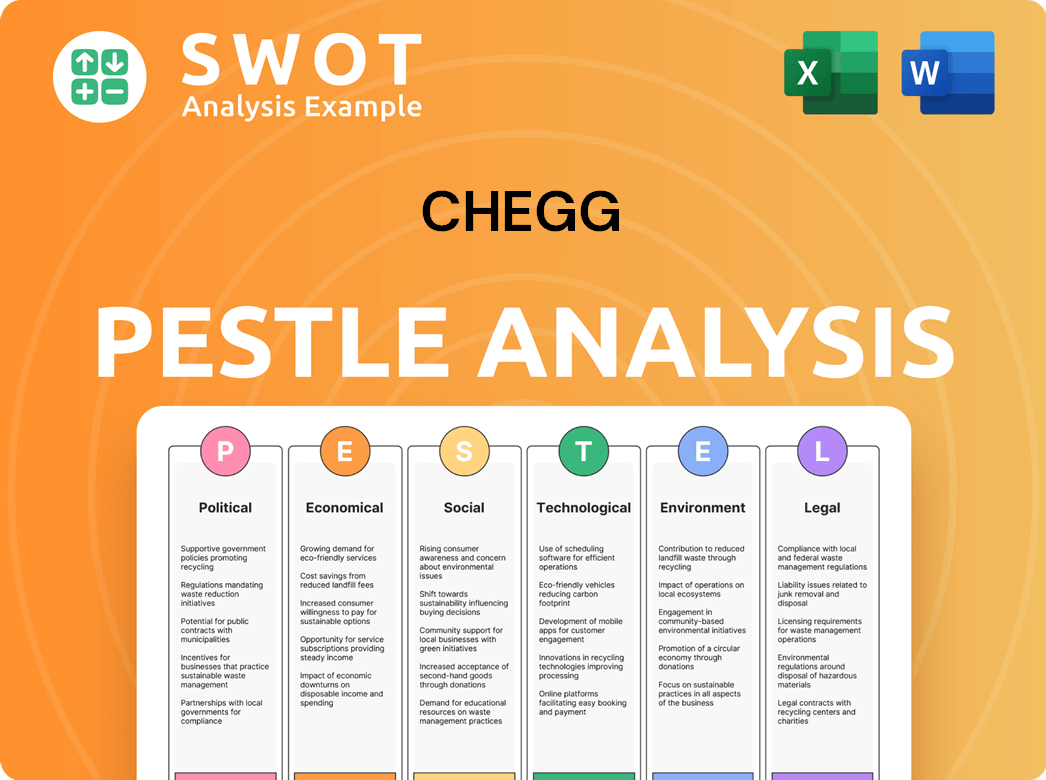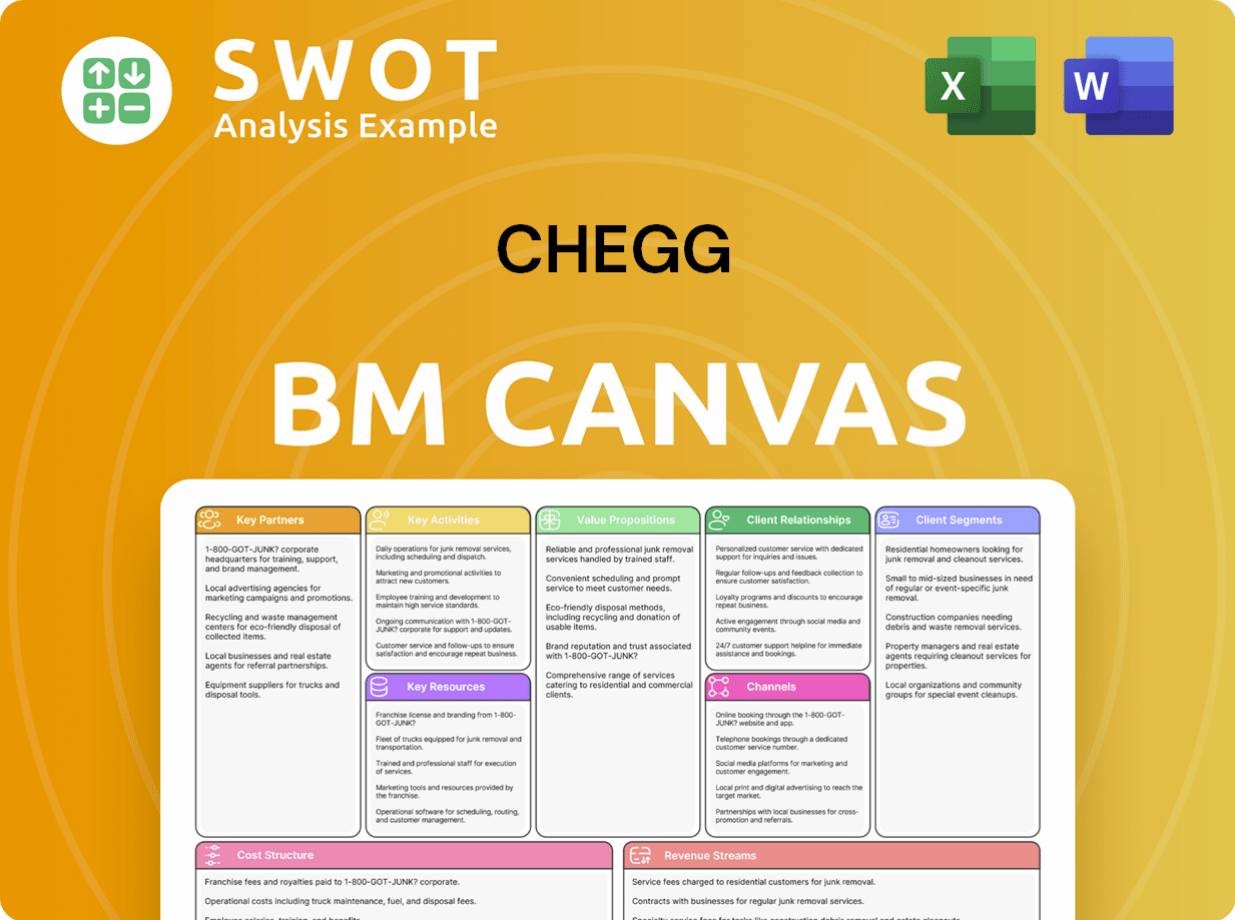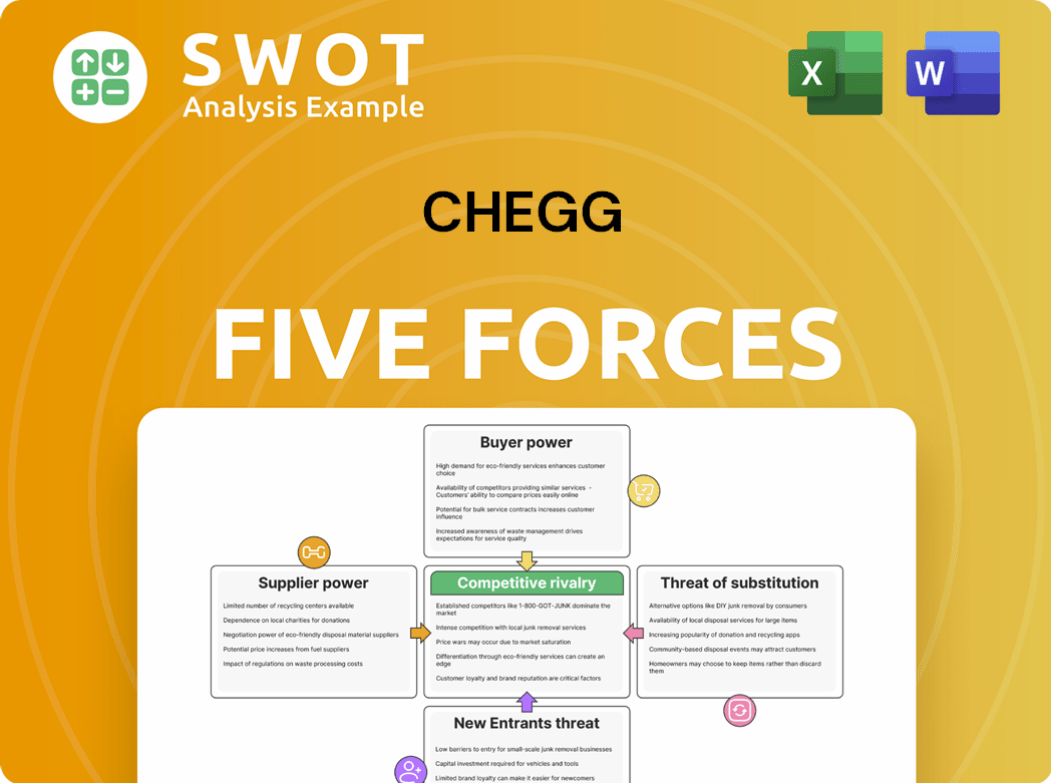Chegg Bundle
What Drives Chegg's Success? Unveiling Its Mission, Vision, and Values
Every successful company is built on a foundation of purpose, aspiration, and guiding principles. Understanding these elements is key to unlocking the strategies and culture that drive a company's success. In the fast-paced world of education technology, what are the core tenets that guide Chegg?

Chegg's Chegg SWOT Analysis reveals how its mission, vision, and core values shape its strategic direction and impact the student experience. Exploring "What is Chegg's mission statement?" and "Chegg vision statement analysis" provides insights into the company's long-term vision and commitment to education. Delving into "Chegg core values examples" and "Chegg's company culture" illuminates how these principles guide Chegg's goals and objectives within the competitive EdTech market, ultimately influencing "How Chegg's values impact students" and the company's overall impact on learning.
Key Takeaways
- Chegg prioritizes students, ROI in education, and innovation.
- Mission, vision, and values guide Chegg's strategic choices.
- AI integration and service diversification reflect core principles.
- Alignment with principles is key for future success.
- Chegg aims to improve student outcomes in education technology.
Mission: What is Chegg Mission Statement?
Chegg's mission is to help every student achieve their best, in school and beyond, by improving the overall return on investment in education.
Let's delve into the heart of Chegg's purpose and how it shapes the company's actions and impact. Understanding the Mission, Vision & Core Values of Chegg is crucial for grasping its strategic direction and its commitment to the education sector.
Chegg places students at the forefront. This student-centric approach is evident in all its services, from textbook rentals to online tutoring, all designed to meet student needs effectively.
The Chegg mission is fundamentally about student success. Chegg aims to empower students to excel academically and prepare them for future careers, demonstrating a long-term commitment to their well-being.
Chegg strives to enhance the return on investment in education. By providing affordable and efficient learning resources, Chegg helps students learn more effectively and at a lower cost, addressing a critical need in the education market.
Chegg offers a comprehensive support system. This includes textbook rentals, tutoring, and career-focused skills training, ensuring students receive multifaceted assistance throughout their academic journey and beyond.
Chegg extends its support beyond the classroom. Initiatives like Chegg Skills are designed to equip students with the skills needed for their future careers, highlighting a forward-thinking approach.
The impact on learning is significant. Chegg's services have been used by millions of students worldwide, with recent data showing a 20% increase in usage of online tutoring services, reflecting Chegg's growing influence in the education sector.
The Chegg mission statement reflects a deep understanding of the challenges students face and a commitment to providing solutions. Its focus on affordability, efficiency, and comprehensive support positions Chegg as a key player in the evolving landscape of education. The Chegg vision and Chegg core values further elaborate on this mission, guiding the company's strategic decisions and operational practices.
Chegg SWOT Analysis
- Complete SWOT Breakdown
- Fully Customizable
- Editable in Excel & Word
- Professional Formatting
- Investor-Ready Format

Vision: What is Chegg Vision Statement?
Chegg's vision is 'to improve the overall return on investment in education by helping students learn more in less time and at a lower cost.'
Let's delve into the implications of Chegg's vision statement and its strategic alignment.
The Chegg mission and vision are closely intertwined. While the mission outlines the 'what' and 'how,' the vision paints a picture of the desired future state. This alignment ensures a cohesive approach to achieving its goals.
Chegg's vision directly targets two critical aspects of education: efficiency and affordability. By aiming to help students learn more effectively and at a reduced cost, Chegg addresses key pain points in the current educational landscape.
Although not explicitly stated, Chegg's vision implies a broader ambition within the education technology sector. The company's strategic moves, such as integrating AI-driven tools and expanding internationally, suggest a desire to become a major player in the global market.
Based on its current trajectory, Chegg's vision appears to be both realistic and aspirational. The company's ongoing efforts to enhance its platform and reach a wider student base support its goal of improving the return on investment in education.
Chegg leverages data analytics to understand student needs and optimize its offerings. For instance, in 2024, Chegg reported over 7.8 million paid subscribers. This data-driven approach is crucial for achieving its vision by continuously improving the learning experience.
Chegg's strategic initiatives, including AI integration and international expansion, are designed to support its vision. These efforts are aimed at enhancing the platform's capabilities and reaching a broader audience, thereby increasing the impact on education.
The Chegg vision statement serves as a guiding principle, driving the company's strategic decisions and influencing its overall direction. The focus on improving the return on investment in education underscores Chegg's commitment to making education more accessible, efficient, and affordable for students worldwide. Understanding Chegg's vision is essential for anyone seeking to understand its long-term goals and its impact on the educational landscape. The company's core values further support this vision, providing a framework for how Chegg operates and interacts with its stakeholders.
Chegg PESTLE Analysis
- Covers All 6 PESTLE Categories
- No Research Needed – Save Hours of Work
- Built by Experts, Trusted by Consultants
- Instant Download, Ready to Use
- 100% Editable, Fully Customizable

Values: What is Chegg Core Values Statement?
Understanding the core values of Chegg is crucial for grasping its operational philosophy and its commitment to its stakeholders. These values guide Chegg's actions, shaping its culture and influencing its strategic direction, ultimately differentiating it within the educational landscape.
This value places the needs and success of students at the forefront of Chegg's operations. It drives the development of tools and services designed to address student challenges, such as providing affordable textbooks and on-demand academic support. This student-centric approach is a key differentiator for Chegg, as it directly aligns with its core purpose of improving educational outcomes.
Encouraging innovation and ambitious goals is at the heart of Chegg's culture. This value fuels the exploration of new technologies, like AI, to enhance learning experiences and the pursuit of new market opportunities. It fosters a forward-thinking mindset, enabling Chegg to adapt and evolve in the dynamic education sector.
This value champions a dynamic and action-oriented approach to decision-making. It promotes open discussion and critical evaluation of ideas before committing to a course of action. This agile approach ensures that Chegg can efficiently implement strategies and adapt to changing market demands, contributing to its overall success.
Transparency is a cornerstone of Chegg's operations, fostering open communication and ethical conduct. This value is reflected in clear communication with customers and stakeholders, ensuring they have access to the information they need. Chegg's commitment to transparency builds trust and reinforces its reputation as a responsible and reliable provider of educational services.
These Chegg core values collectively shape the company's identity, emphasizing a student-centric, innovative, and collaborative approach. They are fundamental to Chegg's mission and vision, driving its strategic decisions and impacting its long-term goals. Understanding these values provides a deeper insight into how Chegg aims to achieve its objectives in the education sector. In the next chapter, we will explore how Chegg's mission and vision influence the company's strategic decisions.
How Mission & Vision Influence Chegg Business?
Chegg's Chegg mission and Chegg vision are not just aspirational statements; they are the guiding principles that shape its strategic direction and operational decisions. These core tenets directly influence how Chegg navigates the competitive landscape and strives to achieve its long-term goals.
The 'student first' Chegg mission and the vision of improving the return on investment in education are central to Chegg's strategic planning. This focus ensures that all initiatives, from product development to market expansion, are aligned with supporting student success and making education more accessible.
- Development and integration of AI-powered tools like Solution Scout.
- Focus on diversifying revenue streams through business-to-institution programs.
- Restructuring efforts aimed at creating a leaner, more efficient organization.
- Legal action against Google to protect its ability to support students.
Chegg's investment in AI-powered tools, such as Solution Scout, is a direct response to its Chegg mission of helping students learn more efficiently. These tools are designed to provide students with faster access to information and more effective study methods. This aligns with the vision of improving educational ROI by maximizing learning outcomes in less time. The global e-learning market is projected to reach $325 billion by 2025, highlighting the importance of such innovations.
Expanding into business-to-institution programs and content licensing demonstrates a strategic move to diversify revenue streams and enhance the impact on student learning. This approach broadens Chegg's reach beyond direct-to-student subscriptions, making educational resources more accessible. The company's ability to adapt to changing market dynamics is crucial, especially given the evolving educational landscape. The global education market is expected to reach $7.2 trillion by 2025.
The restructuring efforts, including workforce reductions in 2024, were aimed at creating a more efficient organization. These difficult decisions were made to better align with revenue trends and focus on core student needs. This demonstrates a commitment to sustaining the Chegg mission within a challenging market. The company's adjusted EBITDA margin goals reflect the financial pressures and the need for operational optimization.
Chegg's legal action against Google underscores its commitment to protecting its ability to reach and support students. This action highlights the importance of maintaining a direct connection with its user base. This is particularly important in a market where competition is fierce, and the ability to control the user experience is critical. The rise of AI-driven search results poses a significant challenge to platforms like Chegg.
Leadership, including CEO Nathan Schultz, consistently emphasizes the 'student first' mission as the driving force behind the company's direction and restructuring efforts. This focus ensures that all strategic decisions are made with the student's needs at the forefront. This commitment is vital for maintaining a strong Chegg company culture and ensuring long-term sustainability. The company's recent focus has been on profitability, with a target of achieving positive free cash flow.
While financial metrics, such as Adjusted EBITDA margin goals, are important, the strategic decisions demonstrate a clear effort to align operations with the core purpose. This alignment is crucial for long-term success. Chegg's ability to adapt to the changing needs of students and the educational landscape will be key to its future performance. The company's focus on profitability and efficiency is a direct reflection of its commitment to its mission.
The Chegg core values are the bedrock of its operations, influencing every aspect of the business, from product development to customer service. Understanding how these values are implemented is crucial for appreciating Chegg's overall strategy. Read the next chapter to learn about Core Improvements to Company's Mission and Vision and how it affects the company's performance and position within the competitive landscape, you can also explore the Competitors Landscape of Chegg to understand its position in the market.
Chegg Business Model Canvas
- Complete 9-Block Business Model Canvas
- Effortlessly Communicate Your Business Strategy
- Investor-Ready BMC Format
- 100% Editable and Customizable
- Clear and Structured Layout

What Are Mission & Vision Improvements?
While Chegg's current statements provide a solid foundation, strategic refinements can ensure they remain relevant and competitive in the evolving EdTech landscape. These improvements aim to enhance Chegg's alignment with market dynamics, technological advancements, and the evolving values of its target audience.
To reflect its strategic focus, Chegg should explicitly mention the role of technology, particularly AI, within its mission statement. This would highlight how Chegg utilizes AI-driven tools to personalize learning experiences and improve student outcomes, which is increasingly important as the EdTech market continues to grow. According to a recent report, the global AI in education market is projected to reach $25.7 billion by 2027, underscoring the significance of this integration.
The vision statement could benefit from a more specific, measurable, achievable, relevant, and time-bound (SMART) goal. Currently, the vision focuses on improving the ROI of education. However, adding a quantifiable goal, such as "to increase student success rates by X% within Y years," would provide a clearer benchmark for success and demonstrate a commitment to measurable impact. This approach aligns with the growing demand for data-driven results in education, as evidenced by the increasing use of learning analytics to track student progress.
Chegg should adapt its mission and vision to explicitly include personalized learning pathways and the development of skills for the future workforce. This could involve highlighting its commitment to offering tailored learning experiences and resources that prepare students for evolving job markets. These changes would reflect a proactive approach to meet the changing needs of students and align with the trend toward lifelong learning, as highlighted in Target Market of Chegg.
Integrating a greater emphasis on sustainability and social responsibility within Chegg's mission or vision would resonate strongly with current student values. This could involve highlighting initiatives related to environmental sustainability, ethical sourcing, or community involvement. This could also attract socially conscious investors, as environmental, social, and governance (ESG) factors are increasingly influencing investment decisions.
How Does Chegg Implement Corporate Strategy?
Implementing a company's mission and vision is crucial for translating aspirational statements into tangible actions. This section explores how Chegg integrates its mission, vision, and core values into its corporate strategy and daily operations.
Chegg demonstrates its commitment to its mission statement through various strategic initiatives and product developments. These initiatives directly reflect the company's dedication to supporting students throughout their academic journey.
- AI Integration: The incorporation of AI into the Chegg platform, exemplified by tools like Solution Scout and enhanced Q&A features, directly supports the mission of helping students learn more effectively. These tools provide students with efficient ways to find answers and understand complex concepts.
- Chegg Skills Programs: The expansion into Chegg Skills programs, offering training for high-growth tech careers, aligns with the vision of supporting students "in school and beyond." This initiative reflects a commitment to providing students with the skills needed for future success.
- Focus on Affordability: Chegg's efforts to make educational resources more affordable, such as offering various subscription options and partnerships, demonstrate a commitment to its core values. This approach ensures that more students can access the resources they need.
- Student-Centric Services: Developing services that directly address student academic needs, such as study tools and tutoring, showcases Chegg's dedication to its mission. These services are designed to improve the learning experience and support academic achievement.
Leadership plays a pivotal role in reinforcing Chegg's mission and vision. CEO Nathan Schultz consistently emphasizes the "student first" mission in company communications and investor calls, ensuring that strategic decisions align with the company's core values.
Chegg communicates its mission, vision, and
Chegg's ESG (Environmental, Social, and Governance) reports detail how the company's practices align with its mission and values, particularly in areas of social responsibility and supporting learners. This reporting demonstrates a commitment to ethical business practices.
While specific formal programs dedicated to reinforcing the mission and vision beyond general corporate communications are not extensively detailed, integrating values into hiring practices and performance evaluations is a common approach. A high percentage of employees reporting being motivated by Chegg's mission and vision suggests successful internal communication and integration.
Chegg Porter's Five Forces Analysis
- Covers All 5 Competitive Forces in Detail
- Structured for Consultants, Students, and Founders
- 100% Editable in Microsoft Word & Excel
- Instant Digital Download – Use Immediately
- Compatible with Mac & PC – Fully Unlocked

Related Blogs
- What are Mission Vision & Core Values of Chegg Company?
- What is Competitive Landscape of Chegg Company?
- What is Growth Strategy and Future Prospects of Chegg Company?
- How Does Chegg Company Work?
- What is Sales and Marketing Strategy of Chegg Company?
- Who Owns Chegg Company?
- What is Customer Demographics and Target Market of Chegg Company?
Disclaimer
All information, articles, and product details provided on this website are for general informational and educational purposes only. We do not claim any ownership over, nor do we intend to infringe upon, any trademarks, copyrights, logos, brand names, or other intellectual property mentioned or depicted on this site. Such intellectual property remains the property of its respective owners, and any references here are made solely for identification or informational purposes, without implying any affiliation, endorsement, or partnership.
We make no representations or warranties, express or implied, regarding the accuracy, completeness, or suitability of any content or products presented. Nothing on this website should be construed as legal, tax, investment, financial, medical, or other professional advice. In addition, no part of this site—including articles or product references—constitutes a solicitation, recommendation, endorsement, advertisement, or offer to buy or sell any securities, franchises, or other financial instruments, particularly in jurisdictions where such activity would be unlawful.
All content is of a general nature and may not address the specific circumstances of any individual or entity. It is not a substitute for professional advice or services. Any actions you take based on the information provided here are strictly at your own risk. You accept full responsibility for any decisions or outcomes arising from your use of this website and agree to release us from any liability in connection with your use of, or reliance upon, the content or products found herein.